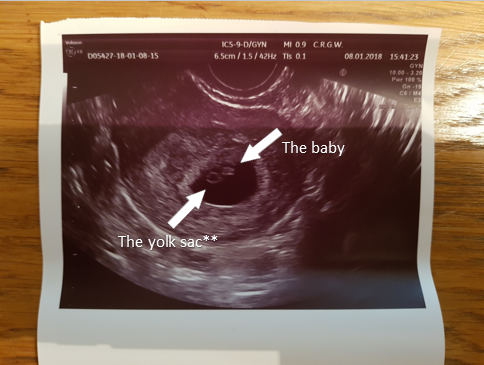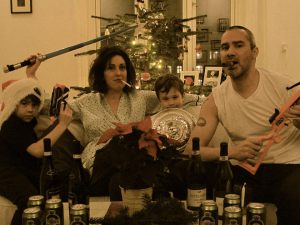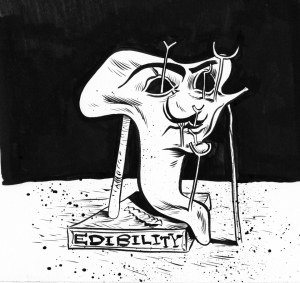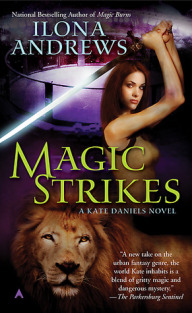Is it true? Are my eyes not deceiving me?
AH! A book review! Finally! My dusty bookworm self is rejoicing: hands up high dancing around a single, teeny-tiny book she was actually able to finish, obviously ignoring the mountain of other books behind her she told herself she would read and some she’s already read halfway but wouldn’t pick up again.
Anyway, it’s been ages since I finished reading a book and I’m glad this was the one that got me back. It’s a very refreshing read. Just enough sweet and just enough wit. Enough to stimulate my heart and mind. LOL. But in all honesty, I’m pretty easy to please as a reader—and straightforward, too.
If I like how the story is going, I tend to finish it real fast, like I can’t wait to know the whole story and reread my favorite parts when done. If I don’t like it, or I’m not hooked yet, I’ll sluggishly proceed with every page, reading without understanding until I’ll get bored and put the book down.
Love and other perishable items was a little bit of both to me. At the start, it took me almost a day to finish Chapter 1. I wasn’t hooked yet, I was still treading shallow waters there. Introduction to the storyline, the character settling to her daily routine to show consistency, that stuff. It was not until the third day when I started reading even when I was sleepy, bringing my desk lamp to my bed so that I can read better. I remember starting to focus on the story at page 60 and had to stop because my eyelids hurt and my body was craving sleep. Although my brain was swarming with Chris and his wit and sarcasm, his strange fondness to the Youngster Amelia.
I was able to finish the book that same night, on my way to work. Imagine. I had at least 220 pages to read but I was able to that on my way to work, approximately one and a half hour. That’s how fast I get when I get into a story. Really get into it.
In general, I loved it. Aforementioned, I’m easy to please. I love the mix of teenage high school drama, the witty exchanges between Chris and Amelia, the family issues, feminism, and patriarchy. Laura dared to dwell on the road less traveled, instead of blaming the patriarchy for always standing above women’s rights, Amelia, oh-insightful-fifteen-year-old-heroine Amelia, hated feminism.
A shock? Yes.
Sensible? Another yes. Once you understand how she sees it.
Before you feminazis get your bazookas and your keyboards ready, hear Amelia out.
Why does a girl hate the thing that gave her freedom to vote, work and have equal rights as the men of this world?
Because as fulfilling as it is at a vantage point—patriarchy is still there, which somehow only makes feminism a burden, at least in Amelia’s point of view. She hated feminism because it meant more work for her mother who already had her hands full. Being a full-time mother and a working mom all-in-one. If it weren’t for feminism, her mom can spend the rest of the day just lounging around the house waiting for her family to come home. Picking up little Jessica from kindergarten and making sure she receives all the love and affection and support she needs in her age. Feminism became added weight; now that there’s feminism she’s also obliged to work because, hey, didn’t all women fight for it? Now that they got it, use it.
In a personal point of view, it’s just so sad. There’s already so much in the shoulders of mothers. You can shit on Amelia for thinking that of her mother, wanting her to be caged in the confines of the house and be subjected to a lifetime of cleaning and laundry and keeping the household presentable. That men and fathers should be expected the same courtesy and responsibility around the house. But will it be fair to her mother? Does her mother think she’s being caged? What if what she wanted was a peaceful time at home caring for her family that she loved with her whole heart?
Amelia sees how miserable and tired her mom always is. As a daughter, that’s extremely saddening, knowing that you’re a burden, even though your mom doesn’t think about you that way at all. But it’s true that all of the things she had to do for the people she loved and the rights she has are taking its toll on her. She’s just so tired all the time and Amelia couldn’t do anything about it because she’s also already been working to support herself.
It should be the patriarchy punished, right? But say, you let men do it, but they do it sloppily, being the people they are, not knowing how to clean properly, they just mess things up more, wouldn’t you just want to do that yourself?
Women can dream higher than dreaming of becoming a good housewife, is what you would say. But what if that is what they want? All women deserve greatness, but what if they want to be a great mom? What if they were brought up in such a way that they devote their life to having kids, passing on their affection, compassion, and knowledge to these young ones and wish for a great future for them?
Why is being a mom, a wife, such a degrading status for women? Why is it just a mom?
Because that means they’re depending on the husband? But why don’t people understand that the men of the family have had mothers as well who raised them well to become these successful, proud men and are depending on their wives as much as they are depended on?
Well, that’s what I’ve got from reading.
Yeah, feminism’s great. We’ve got rights, we’ve got freedom. We can achieve more now. But that doesn’t mean being a housewife and a mother is less. Our circle has grown, our boundaries expanded but being a great mom and a great wife is still inside that circle.
I just hope we appreciate wives and moms who just stay home and are happy where they are.
*Phew!*
That was long. And I haven’t even talked about Chris and Amelia!
Usually, I like how authors describe a scene, full of adjectives and give you every detail so that you can imagine it in your mind. But seeing as this book was a diary entry style, I appreciated the lack of words, but the intensity of feeling. Also, on Chris’ end, it felt so right that he almost never mentioned the kiss, implying that he was so hammered that he didn’t know he got to kiss Amelia. The whole time I was like, yes, right. If he’d reject her the next day it should only show that the kiss shouldn’t be given that much importance in his notes. The fact that he wrote so much about how fascinated he was about Amelia’s insights also showed the affection he tried to fight and/or hide.
I hated the ending though. Hated it with a passion.
It was adequate, yes. Nothing could ever happen because Chris is an adult and Amelia is 15 but I just wanted something else, something more. I lowkey hated how Amelia was like I’ll wait, when Chris is just gone like that. I don’t even know; the end could go a lot of other ways but it didn’t.
So much for the Youngster.
A sequel would be great, though. Because all that pent-up feeling, all the things that couldn’t happen can happen in the sequel. So Love and other perishable items can serve as the majestic prologue to the even more majestic love story of Chris and Amelia.
So that’s it!
Personally, I think this review is lacking. I’ve never been one to know how to organize my thoughts better so I know I’ll have to work on that.
I think I also have to read other book reviews to see how the thought process should go and what they usually include, to ensure that I’ve covered what I need to. Anyway, this is just the first of my hopefully growing list of book reviews. Please bear with me!
Love and other perishable items: 7 out of 10






